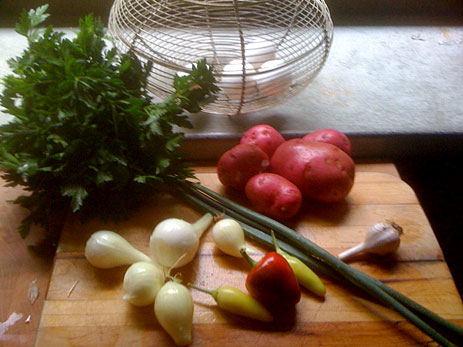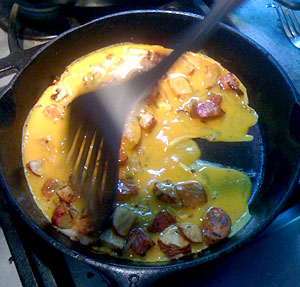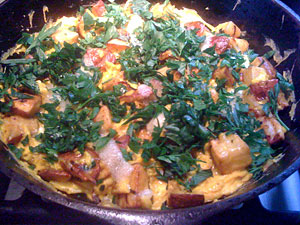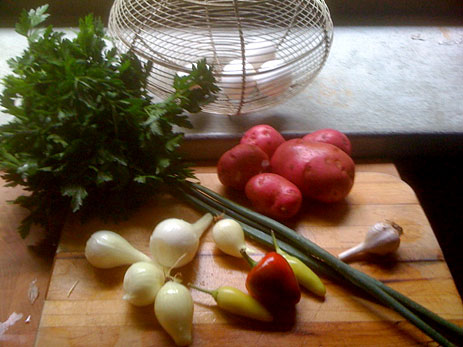Many people claim they don’t have time to cook fresh meals “from scratch.” In Tom’s Kitchen, Grist’s food editor discusses some of the quick and easy things he gets up to in … well, his kitchen. Forgive the lame iPhone photography.
 First, assemble your fixings.Vegetable farming is hard work — and hard work requires hearty food. Before I began earning my keep as a full-time writer a couple of years ago, I would start most mid-summer days harvesting at dawn. We would eat a light breakfast of fruit and yogurt before going out, but our real morning meal would be “second breakfast” a few hours later, typically built on whatever we were harvesting.
First, assemble your fixings.Vegetable farming is hard work — and hard work requires hearty food. Before I began earning my keep as a full-time writer a couple of years ago, I would start most mid-summer days harvesting at dawn. We would eat a light breakfast of fruit and yogurt before going out, but our real morning meal would be “second breakfast” a few hours later, typically built on whatever we were harvesting.
Late July is when we harvest our very first potatoes. In small-scale production, you harvest potatoes with a pitchfork, plunging it into the earth a foot or two from the potato plant. You uproot the plant, turning it upside down. If the gods are cooperating, handfuls of beautiful spuds present themselves. In the course of a morning’s harvest, several potatoes get “speared” — accidentally pierced by the pitchfork’s tine. We would set aside these unsellable potatoes for second breakfast.
After several hours of harvesting, washing, and packing, an enormous hunger arises. I will never forget the anticipation and satisfaction those second breakfasts of farm eggs and fresh-dug new potatoes brought.
The phrase “new potato” simply refers to potatoes that have not been preserved for winter in a root cellar. I find that, properly done, they produce roast-potato nirvana: crisp and caramelized on the outside, moist, ethereal, and sweet on the inside — each bite like like a soufflé encased in a crust.
After a strenuous recent morning at the writing table, I went to the garden and harvested some potatoes, green onions, garlic, chile peppers, and parsley. I made an old-fashioned “second breakfast” as follows:
Scrambled eggs with roasted new potatoes
Serves two
Preheat oven to 450; heat a mid-sized cast-iron pan over medium-low heat.
Mise en place:
One good handful of new potatoes, scrubbed and cut into roughly uniform half-inch cubes
Olive oil
Aromatic vegetables such as two small fresh onions, sliced thin; a clove or two of garlic, chopped; and, for a little fire, a chile pepper, chopped
Three eggs
A handful of parsley, chopped
Salt and a loaded pepper grinder
A few slices of your favorite melting cheese, optional
 Dry the potato chunks thoroughly with a cloth towel. This is critical: wet potatoes won’t caramelize, and they’ll likely stick to the bottom of the pan. Adjust heat under the skillet to medium, and add enough oil to generously cover the bottom of the pan. When the oil shimmers, add the potatoes and a good pinch of salt. Shake the pan vigorously, coating the potatoes with oil. If any of them stick, loosen with a spatula. When the potatoes are sizzling vigorously and you know they’re not sticking, put them into the oven. If you have a convection oven, turn on the fan. This will help them brown.
Dry the potato chunks thoroughly with a cloth towel. This is critical: wet potatoes won’t caramelize, and they’ll likely stick to the bottom of the pan. Adjust heat under the skillet to medium, and add enough oil to generously cover the bottom of the pan. When the oil shimmers, add the potatoes and a good pinch of salt. Shake the pan vigorously, coating the potatoes with oil. If any of them stick, loosen with a spatula. When the potatoes are sizzling vigorously and you know they’re not sticking, put them into the oven. If you have a convection oven, turn on the fan. This will help them brown.
Now kill some time: do some dishes, write an email, read a Grist article.
After ten or so minutes, take the potatoes out and give them a shake; return to overn. Now crack the eggs into a bowl, add a pinch of salt and a generous grind of pepper, and whisk until just uniform. Kill a few more minutes, and pull the potatoes out and give them another shake. They will be starting to brown. Add the onions, and shake the pan again to distribute them. Don’t add garlic at this point — it burns too easily.
 Return skillet to oven. Check potatoes every five minutes or so, shaking each time. When they are nicely browned and slightly shriveled, they are ready. At that point, add the garlic, chile (if using), and a good lashing of black pepper. Shake and taste for seasoning. (At this point, you will have sublime roast potatoes. You could stop here, and omit the eggs above.) Add the eggs to the pan, which will still be sizzling hot. With a spatuala, stir gently, incorporating the eggs into the roast potatoes. When they have not quite set, top with sliced cheese and return to oven for a minute or two to melt. They will emerge from the oven well-set and ready to eat immediately.
Return skillet to oven. Check potatoes every five minutes or so, shaking each time. When they are nicely browned and slightly shriveled, they are ready. At that point, add the garlic, chile (if using), and a good lashing of black pepper. Shake and taste for seasoning. (At this point, you will have sublime roast potatoes. You could stop here, and omit the eggs above.) Add the eggs to the pan, which will still be sizzling hot. With a spatuala, stir gently, incorporating the eggs into the roast potatoes. When they have not quite set, top with sliced cheese and return to oven for a minute or two to melt. They will emerge from the oven well-set and ready to eat immediately.
Top with chopped parsley.
Served with strong coffee, you’ve got a classic Maverick Farms second breakfast. Paired with a green salad, it also works as a light dinner that cries out for a crisp white wine.


